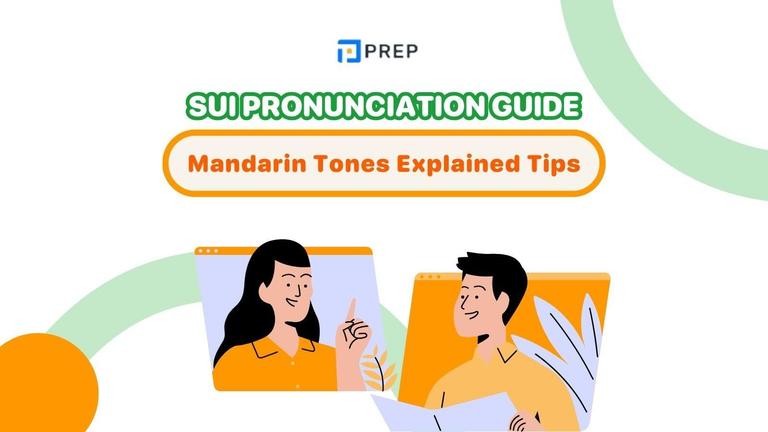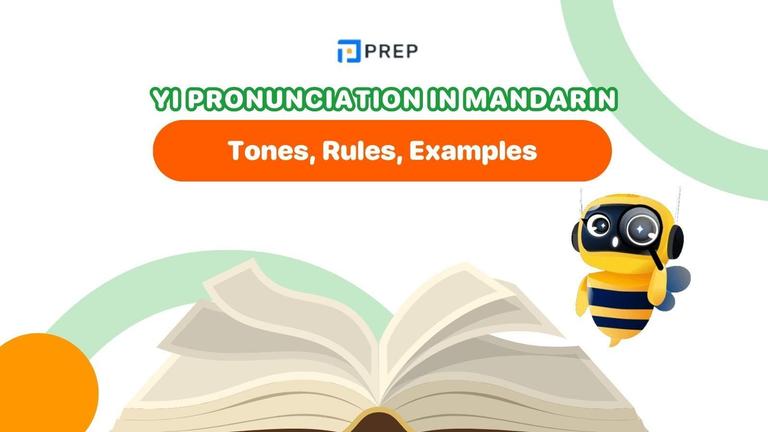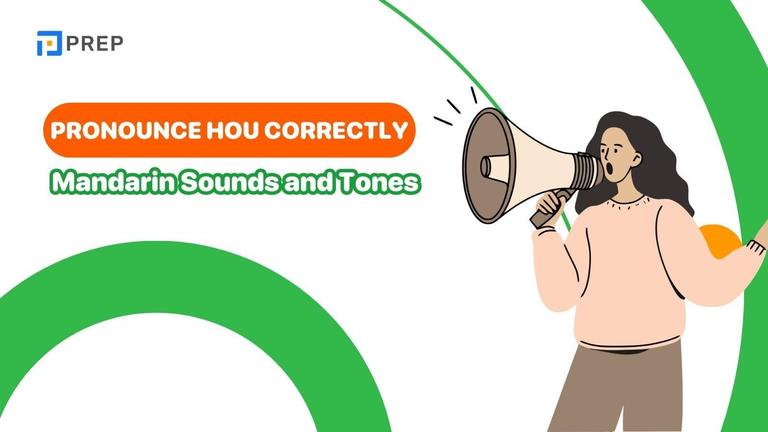A collection of C1 vocabulary by common topic
To achieve C1 level of English proficiency, you need to possess and use vocabulary that is equivalent to that level. Especially in the IELTS exam, the more you employ appropriate C1-level vocabulary according to contexts, the faster you can improve your band score. In the below article, PREP has collected C1-level English vocabulary across 10 advanced topics for reference!

I. A collection of C1 vocabulary by common topic
Different from the subjects covered in English vocabulary levels A1, A2, B1, and B2, the C1 level introduces more challenging vocabulary, with more academic and specialized topics. What are these complicated subjects? Let's dive into them with PREP below!
1. Books
Regarding books and stationery, the vocabulary seems simple at first. However, with deeper research, we will discover numerous C1 level English vocabulary, particularly when delving into the study of ancient books. Let's reveal these words together with PREP!

|
C1 word list: Books |
|
| allegory (n): a story, play, picture, etc. in which each character or event is a symbol representing an idea or a quality, such as truth, evil, death, etc.; the use of such symbols | sequel (n): a book, film, play, etc. that continues the story of an earlier one |
| comic strip (n): a series of drawings inside boxes that tell a story and are often published in newspapers | true crime (n): a genre of book, film, etc. that examines or tells the story of a real crime |
| whodunnit (n): a story, play, etc. about a murder in which you do not know who did the murder until the end | symbolism (n): the use of symbols to represent ideas, especially in art and literature |
| autobiography (n): the story of a person’s life, written by that person; this type of writing | trilogy (n): a group of three books, films, etc. that have the same subject or characters |
| backstory (n): the things that are supposed to have happened to the characters in a film, novel, etc., before the film, etc. starts | tragic (adj): making you feel very sad, usually because somebody has died or suffered a lot |
| title page (n): a page at the front of a book that has the title and the author’s name on it | script (n): a written text of a play, film, broadcast, talk, etc. |
| twist (n): the action of turning something with your hand, or of turning a part of your body | proofread (v): to read and correct a piece of written or printed work |
| characterization (n): the way that a writer makes characters in a book or play seem real | compose (v): to write music |
| dramatist/playwright (n): a person who writes plays for the theatre, television or radio | co-author (v): a person who writes a book or an article with somebody else |
| first-person (adj): showing that someone is speaking or writing about themselves | ironic (adj): showing that you really mean the opposite of what you are saying |
| hardcover book (n): a book that has a stiff cover | intriguing (adj): very interesting because of being unusual or not having an obvious answer |
| paperback book (n): a book that has a thick paper cover | inspirational (n): providing exciting new ideas; making somebody want to create something, especially in art, literature or music |
| appendix (n): a small bag of tissue that is attached to the large intestine. In humans, the appendix has no clear function. | gripping (adj): exciting or interesting in a way that keeps your attention |
| pamphlet (n): a very thin book with a paper cover, containing information about a particular subject | appealing (adj): attractive or interesting |
2. Literature
How many C1 level English words are related to literature? Let’s check them out with PREP in the below table!

|
C1 level vocabulary: Literature |
|
| Plot (n): the series of events that form the story of a novel, play, film, etc. | stanza (n): a group of lines in a repeated pattern that form a unit in some types of poem |
| subplot (n): a series of events in a play, novel, etc. that is separate from but linked to the main story | alliteration (n): the use of the same letter or sound at the beginning of words that are close together, as in sing a song of sixpence |
| synopsis (n): a summary of a piece of writing, a play, etc. | trope (n): a word or phrase that is used in a way that is different from its usual meaning in order to create a particular mental image or effect. |
| byline (n): a line at the beginning or end of a piece of writing in a newspaper or magazine that gives the writer’s name | |
| catharsis (n): the process of releasing strong feelings, for example through plays or other artistic activities, as a way of providing relief from anger, mental pain, etc. | Caption (n): words that are printed below a picture, cartoon, etc. that explain or describe it |
| cliche (n): a phrase or an idea that has been used so often that it no longer has much meaning and is not interesting | character count (n): the number of letters in a text |
| copyright (n): the legal right to control the production and selling of a book, play, film, photograph, or piece of music | couplet (n): two lines of poetry next to each other, especially ones that rhyme (= have words with the same sounds) and have the same length and rhythm |
| denouement (n): the end of a story, in which everything is explained, or the end result of a situation | epithet (n): an adjective added to a person's name or a phrase used instead of it, usually to criticize or praise them |
| discourse (n): the use of language to communicate in speech or writing, or an example of this | exegesis (n): an explanation of a text, especially from the Bible, after its careful study |
| dystopia (n): a very bad or unfair society in which there is a lot of suffering, especially an imaginary society in the future, after something terrible has happened; a description of such a society | free-verse (n): poetry whose lines do not have a regular pattern |
| elegy (n): a sad poem or song, especially remembering someone who has died or something in the past | jargon (n): special words and phrases that are used by particular groups of people, especially in their work |
| hubris (n): a way of talking or behaving that is too proud | monologue (n): a long speech by one person |
| hyperbole (n): a way of speaking or writing that makes someone or something sound bigger, better, more, etc. than they are | onomatopoeia (n): the act of creating or using words that include sounds that are similar to the noises the words refer to |
| prosody (n): the pattern of rhythm and sound in poetry | paradigmatic (adj): relating to the way different words or language items can be chosen to play a particular part in a language structure |
| soliloquy (n): a speech in a play that the character speaks to himself or herself or to the people watching rather than to the other characters | pun (n & v): a humorous use of a word or phrase that has several meanings or that sounds like another word |
3. Urban life
The urban life in the modern day is constantly changing. What vocabularies do we commonly use to describe the city objects and lifestyles? Let's discover them together in the table below with PREP!
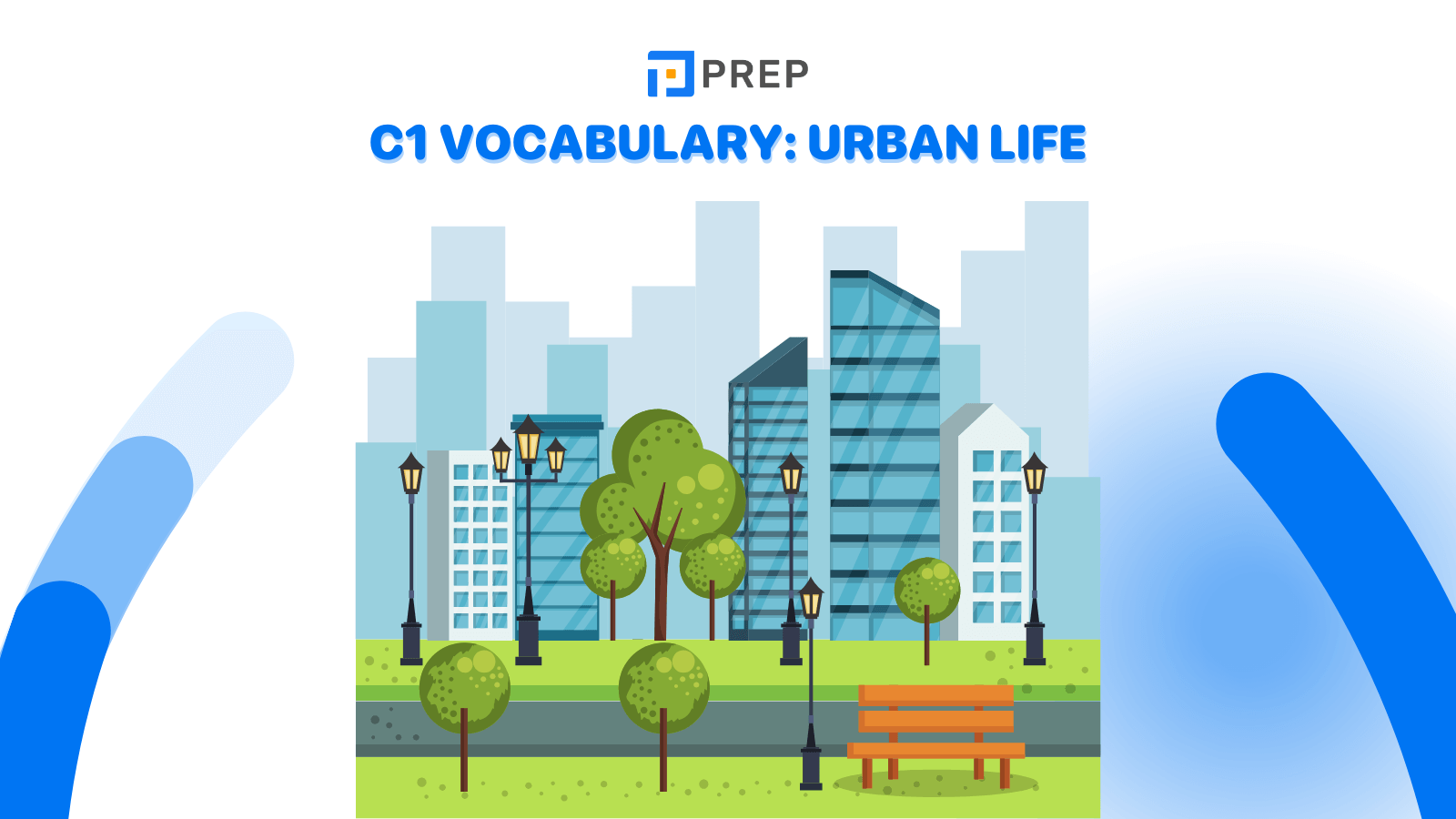
|
C1 English vocabulary: Urban life |
|
| apartment building (n): a large building that is divided into apartments | amenities (n): something, such as a swimming pool or shopping centre, that is intended to make life more pleasant or comfortable for the people in a town, hotel, or other place |
| art gallery (n): a building where works of art can be seen by the public | backstreet (n): the older and poorer areas of a town or city |
| amusement park (n): a large permanent area for public entertainment, with entertaining activities and big machines to ride on or play games on, restaurants, etc., sometimes all connected with a single subject | bus route (n): the route regularly followed by a passenger bus |
| botanical garden (n): a park where plants, trees and flowers are grown for scientific study | city dweller (n): a person who lives in a city |
| bus terminal/taxi stop (n): a place, building or set of buildings where journeys by train, bus or boat begin or end | commuter (n): a person who travels into a city to work each day, usually from quite far away |
| concrete jungle (n): a way of describing a city or an area that is unpleasant because it has many large modern buildings and few trees or parks | commuter belt (n): an area around a city where many people who work in the city live |
| convenience store (n): a shop that sells food, drinks, etc. and is usually open until late | congestion/traffic jam (n):a situation in which a place is too blocked or crowded, causing difficulties |
| shopping precinct/mall (n): an area of a town or city in which no vehicles are allowed and where there are a lot of stores | skyscraper (n): a very tall modern building, usually in a city |
| cultural center (museums, festivals…) (n): an organization, building or complex that promotes culture and arts | conurbation (n): a large area where towns have grown and joined together, often around a city |
| downtown (n): the centre of a city, especially its main business area | cosmopolitan (adj): containing people of different types or from different countries, and influenced by their culture |
| drive-through (n): a restaurant, bank, etc. where you can be served without having to get out of your car | cycle path (n): a path or track that only people on bicycles are allowed to use |
| health facilities (hospital, clinic, dental clinic, health center…) (n): any location where healthcare is provided | exurb (extra-urban) (n): the parts of a town or city that are furthest from the centre |
| pavement café (n): a portion of an eating or drinking place, located on a public sidewalk, that provides waiter or waitress service | outskirt (adj): the parts of a town or city that are furthest from the centre |
| multi-storey car park (n): a large building with several floors for parking cars in | metropolis (n): a large, important city (often the capital city of a country or region) |
| neighborhood (n): the area of a town that surrounds someone's home, or the people who live in this area | inner city (n): the central part of a city where people live and where there are often problems because people are poor and there are few jobs and bad houses |
| industrial zone/business park (n): and that permits the manufacturing of industrial products, factories, power plants, warehouses, and other uses that are important to that area's economy | high street (n): (especially in names) the main street of a town, where most shops, banks, etc. are |
| no-go zone/area (n): an area that is dangerous or where people are not allowed to go | housing estate (n): an area in which a large number of houses or flats are planned and built together at the same time |
| shantytown (n): an area in or near an area town where poor people live in shanties | office building/office block (n): enlarge imagea large building that contains offices, usually belonging to more than one company |
| residential area/residential building (n): a district where people live; occupied primarily by private residences | pedestrian zone (n): an area that has been concerted for the use of pedestrians only, by excluding all motor vehicles |
| rush hour (n): the time, usually twice a day, when the roads are full of traffic and trains are crowded because people are traveling to or from work | |
4. Environment and climate change
Climate change has become one of the global challenges. To better understand and study more information about this issue, we need to supplement ourselves with quite a lot of advanced C1 level vocabularies. What environment-related vocabularies are commonly used? Let's discover them together with PREP below!
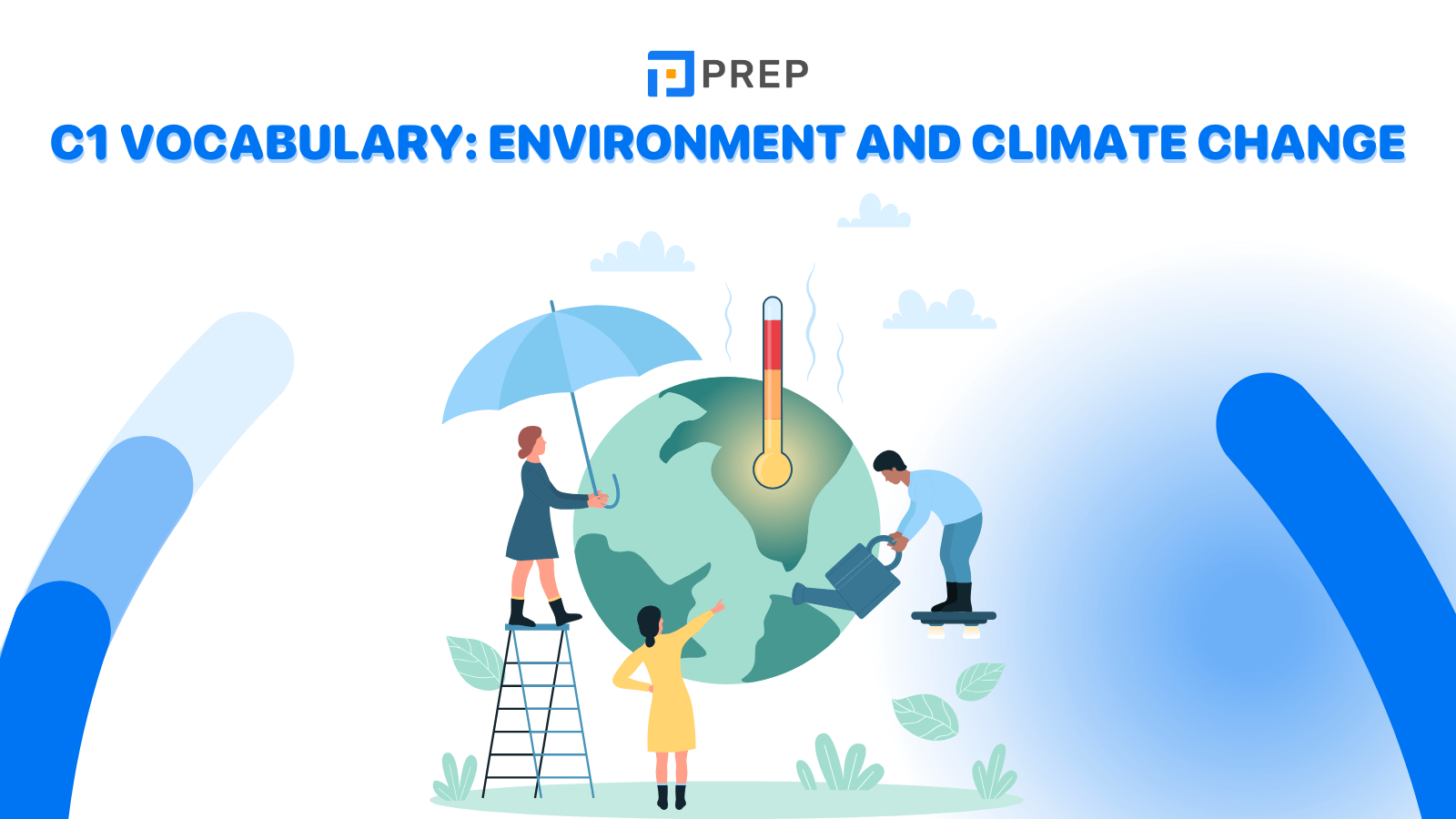
|
C1 vocabulary: Environment and climate change |
|
| acid rain (n): rain that contains harmful chemicals from factory gases and that damages trees, crops and buildings | aftershock (n): a small earthquake that happens after a bigger one |
| carbon footprint (n): a measure of the amount of carbon dioxide that is produced by the activities of a person or company | clearcutting/clearfelling (v): Clearing or cutting down most or all trees in an area |
| carbon-neutral (adj): in which the amount of carbon dioxide produced has been reduced to nothing or is balanced by actions that protect the environment | climate denial (n): (thái độ) the fact of refusing to accept that climate change is happening and is caused by human behaviour |
| carbon capture and storage (n): the process of collecting carbon dioxide produced by burning coal, oil, etc. and other industrial processes, and storing it so that it does not affect the atmosphere | disaster area (n): a place where a disaster has happened and that needs special help |
| climate emergency (n): a situation in which immediate action is needed to reduce or stop climate change and prevent serious and permanent damage to the environment | domestic waste/household waste (n): disposable materials generated by households |
| electrical storm (n): a violent storm in which electricity is produced in the atmosphere | eco-anxiety (n): a feeling of worry about threats to the environment, such as pollution and climate change |
| greenhouse gas (n): any of the gases that are thought to cause the greenhouse effect, especially carbon dioxide | energy-efficient (adj): using only as much energy as is needed without waste |
| ozone-friendly (adj): not containing substances that will damage the ozone layer | hazardous waste (n): a waste with properties that make it dangerous or capable of having a harmful effect on human health or the environment |
| shock wave (n): a movement of very high air pressure that is caused by an explosion, earthquake, etc. | zero-emission (adj): used to describe a vehicle that does not produce gases that cause pollution |
| solar radiation (n): general term for the electromagnetic radiation emitted by the sun | the human impact (phrase): changes to biophysical environments and to ecosystems, biodiversity, and natural resources caused directly or indirectly by humans |
| tremor (n): a small earthquake in which the ground shakes slightly | a drastic change (phrase): a very great change |
| waterspout (n): a column of water that is pulled up from the sea during a storm by a column of air that turns round and round rapidly | an insurmountable challenge (phrase): a challenge that is so great that it cannot be dealt with successfully |
5. Culture & tradition
Culture and tradition are never forgotten due to their inheritance and evolution. For this reason, the range of vocabularies used to discuss this topic is relatively extensive. What C1 vocabularies are commonly used in this topic? Let's explore them together!

|
C1 vocabulary: Culture & tradition |
|
| a melting-pot (n): a place where many different people and ideas exist together, often mixing and producing something new | chauvinism (n): the strong and unreasonable belief that your own country or race is the best or most important |
| acculturation (n): the process of changing so that you become more like people from a different culture, or of making someone change in this way | nostalgic (adj): a feeling of pleasure and also slight sadness when you think about things that happened in the past |
| biculturalism (n): the fact or practice of including or representing two different cultures | patriotism (n): the feeling of loving your country more than any others and being proud of it |
| civilization (n): human society with its well developed social organizations, or the culture and way of life of a society or country at a particular period in time | peoplehood (n): the state or condition of being, or of belonging to, a (unified) people |
| commercialism (n): the principles and activity of commerce, especially those connected with profit rather than quality or doing good | sacred cow (n): a belief, custom, etc. that people support and do not question or criticize |
| contemporary culture/modern culture (n): current, shared themes, beliefs and values of the society | social stratification (n): a society's categorization of its people into groups based on socioeconomic factors like wealth, income, race, education, ... |
| counter-culture (n): a set of values, ideas, and ways of behaving that are completely different from those of the rest of society. | stereotype (n): a fixed idea or image that many people have of a particular type of person or thing, but which is often not true in reality and may cause hurt and offence |
| culture diffusion (n): the spreading out of culture, culture traits, or a cultural pattern from a central point | subculture (n): the behaviour and beliefs of a particular group of people in society that are different from those of most people |
| cultural conflict (n): a type of conflict that occurs when different cultural values and beliefs clash | supremacism (n): the belief that a particular type or group of people should lead or have control over other types or groups because they are better than them |
| cultural relativism (n): the position that there is no universal standard to measure cultures by, and that all cultural values and beliefs must be understood | traditional beliefs and customs (phrase): beliefs and practices that have evolved over time, with the only difference appearing to be the length of time and observance by a larger segment of society |
| culture shock (n): a feeling of being confused and worried that somebody may get when they visit another country or experience a different way of life or set of attitudes, because the experience is so different from what they are used to | to embrace cultural differences (phrase): accept cultural differences |
| cyberculture (n): A unique set of habits-values-and other elements of culture that have evolved from the use of computers and the internet | the fabric of society (phrase): the interconnected and interdependent nature of a community or a nation |
| denominationalism (n): the tendency to divide or cause to divide into sects or denominations | a historical site (phrase): a place that is important in the history, architecture, archaeology, or culture of a country, state, or city |
| discrimination (n): the practice of treating somebody or a particular group in society less fairly than others | core values (phrase): personal ethics or ideals that guide you when making decisions, building relationships and solving problems |
| enculturation (n): the modification from infancy of an individual's behaviour to conform with the demands of social life | intangible cultural heritage: a practice, representation, expression, knowledge, or skill considered by UNESCO to be part of a place's cultural heritage |
| epistemology (n): the part of philosophy that deals with knowledge | long-standing culture: a culture or tradition that has existed for a long time |
| exotic culture (n): a culture that is distinct from your own, or one that is seen as highly unusual or out-of-the-ordinary | shanties and dirges: traditional songs |
| folk culture (n): the products and practices of relatively homogeneous and isolated small-scale social groups living in rural locations | indigenous culture/local culture (n): native societies of various regions in the world that existed before colonization occurred |
| homogeneous (adj): consisting of things or people that are all the same or all of the same type | intellectualism (n): the use of your ability to think in a logical way and understand things rather than of your emotions |
| inheritance/heritage (n): the history, traditions, buildings and objects that a country or society has had for many years and that are considered an important part of its character | cultural integration (n): when individuals from one culture adopt practices from another culture without diminishing their own |
| multiculturalism (n): the practice of giving importance to all cultures in a society | |
6. Economy
Economics is a rather complex topic that involves many technical terms that not everyone can fully understand. Let's discover together with PREP some important C1 vocabularies commonly used for discussing this topic!
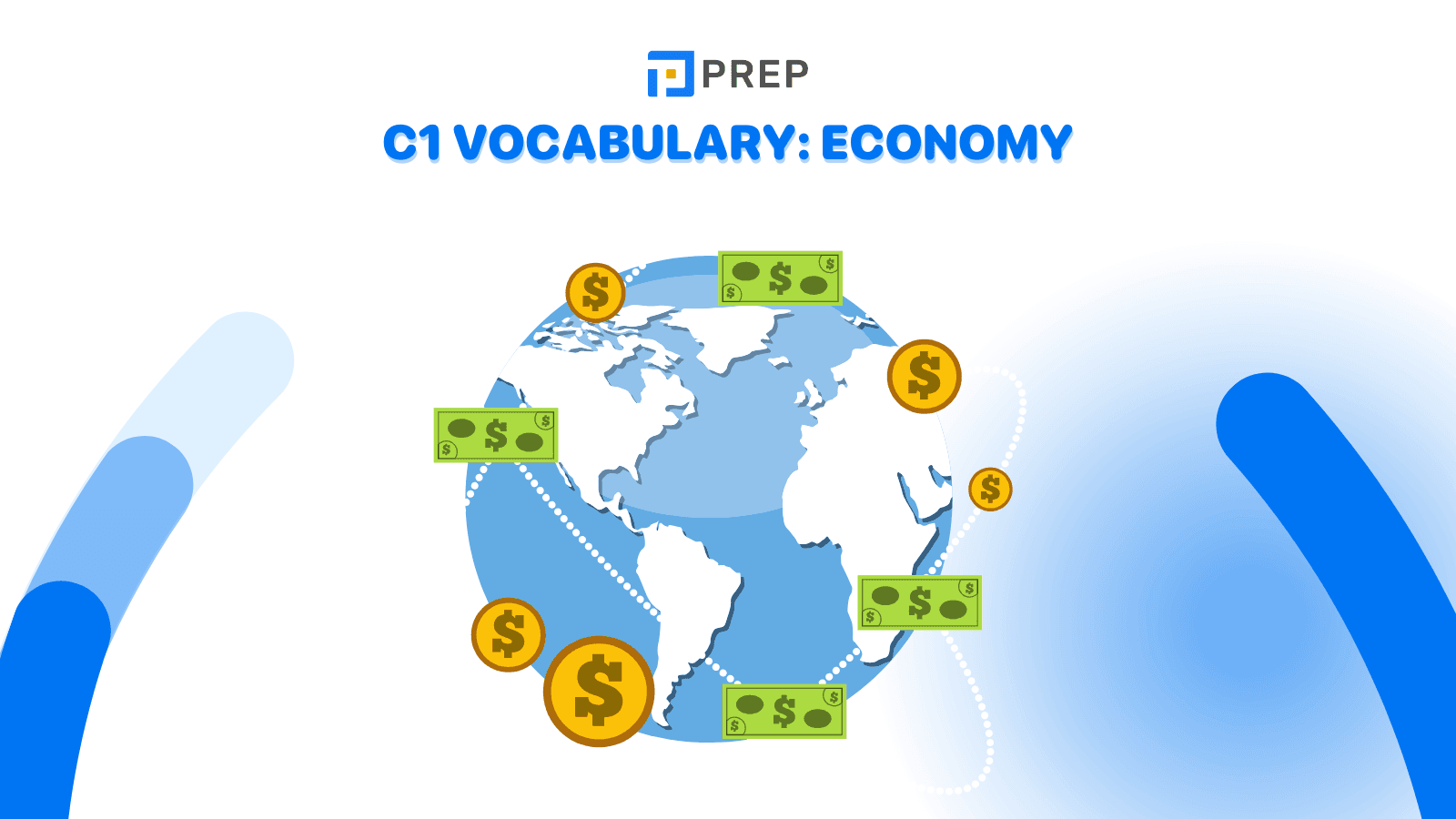
|
C1 vocabulary: Economy |
|
| accelerated depreciation (n): a method by which a company reduces an asset’s value in its accounts by more in the early years of its life than in later years | accommodating monetary policy (n): when central banks expand the money supply to boost the economy |
| active balance (n): surplus, operating balance (the amount of currency that circulates regularly during the period between payments) | amortize (v): to pay back a debt by making small regular payments over a period of time |
| aggregate output (n): the sum of all the goods and services produced in an economy over a certain period of time (similar to GDP) | autarky (n): a system of government of a country in which one person has complete power |
| bilateral assistance (n): the aid given by a government directly to the government of another country | balanced growth (n): the simultaneous, coordinated expansion of several sectors |
| budget deficit (n): the difference between a government's income and how much it spends | deflation (n):the action of making something smaller by removing the air from inside it; the fact of becoming smaller in this way |
| buffer stocks (n): a large supply of a commodity (= a crop, metal, fuel, etc.) that is bought and stored when extra is available, and sold when there is not enough, in order to control its price and quantity in the economy | e-commerce (n): the business of buying and selling goods and services on the internet. E-commerce is short for electronic commerce |
| capital expenditure (n): money that a company spends on land, buildings, and equipment that it uses to produce products and provide services | embargo (n): an order to temporarily stop something, especially trading or giving information |
| credit crunch (n): economic conditions that make financial organizations less willing to lend money, often causing serious economic problems | financial year/fiscal year (n): a period of twelve months (not always January to December) for which a business, government, etc. plans its management of money |
| earning per share (EPS) (n): a company's profits over a particular period divided by the number of its shares | hyperinflation (n): a condition where the price of everything in a national economy goes out of control and increases very quickly |
| gross domestic product (GDP) (n): tổng sản phẩm nội địa | macroeconomics and microeconomics (n): kinh tế vĩ mô và kinh tế vi mô |
| gross national product (GNP) (n): the total value of goods and services produced by a country in a year | freelancer (n): someone who is not employed by any one organization but does particular pieces of work for different organizations |
| free trade agreement (n): a pact between two or more nations to reduce barriers to imports and exports among them | market economy (n): an economic system in which goods and services are made, sold, and shared and prices set by the balance of supply and demand |
| foreign direct investment (n): money that is invested in companies, property, or other assets by people or organizations from other countries | recession/depression (n): a period when the economy of a country is not successful and conditions for business are bad |
| supplementary taxation (n): the additional taxes due for an increase in the assessed value resulting from an ownership change | stock market (n): a place where shares in companies are bought and sold, or the organization of people whose job is to do this buying or selling |
| transnational corporation (n): an enterprise that is involved with the international production of goods or services, foreign investments, or income and asset management in more than one country | subsidy (n): money given as part of the cost of something, to help or encourage it to happen |
| supply and demand (n): the idea that the price of goods and services depends on how much of something is being sold and how many people want to buy it | tariff (n): a charge or list of charges either for services or on goods entering a country |
| stagnant economy (n): an economy experiencing very little growth or no growth at all | |
7. Food & Nutrition
A1 and A2 vocabularies related to food and drinks primarily include basic dish names. However, studying C1 vocabularies needs a deeper research of the subject with more advanced scientific terms!
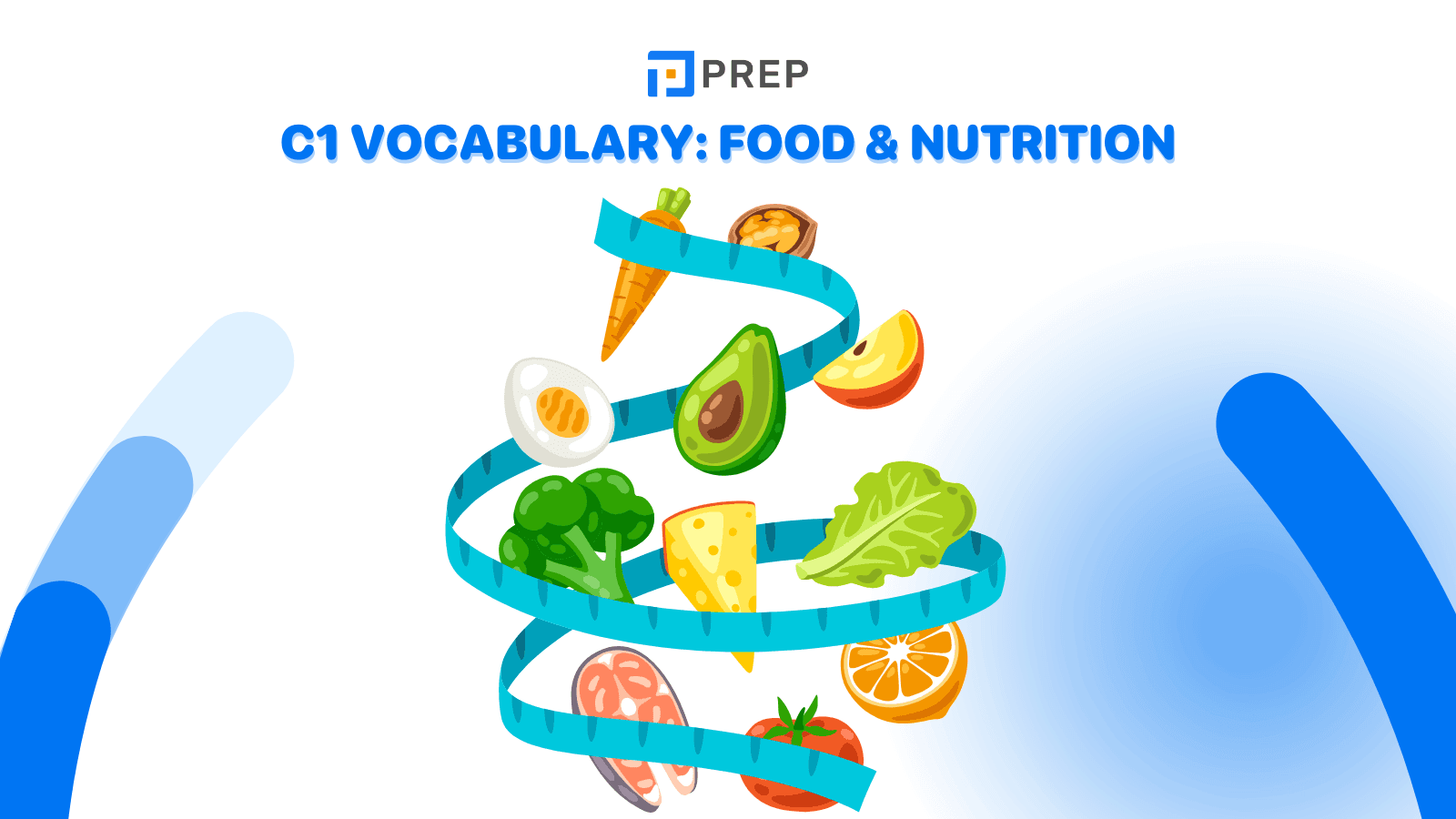
|
C1 vocabulary: Food & Nutrition |
|
| bolt down (v): to eat food very quickly | daily consumption (n): the amount of food that you eat in one day |
| a big eater (n): someone who eats a lot | exotic food (n): foods that are not native to your country |
| fussy eater (n): an unwillingness to eat familiar foods or to try new foods, as well as strong food preferences | nutritional benefit (n): positive effects or advantages that a particular food or dietary component provides to an individual's health and well-being |
| doggy bag (n): a bag for taking home any food that is left after a meal in a restaurant | expiry date (n): the date after which an official document, agreement, etc. is no longer legally acceptable, or after which something should not be used or eaten |
| fine dining (n): a style of eating that usually takes place in expensive restaurants, where especially good food is served to people, often in a formal way | home cooked (adj): food that is made or cooked at home |
| a scrumptious meal (n): a luxurious and appetizing meal | organic food (n): foods that are grown, handled and prepared in a way that is safe for the environment |
| a slap-up meal (n): a large and very good meal | food allergy (n): an allergy to a specific type of food |
| gourmet (adj): of high quality and often expensive; connected with food or drink of this type | food poisoning (n): an illness of the stomach caused by eating food that contains harmful bacteria |
| junk food (n): food that is quick and easy to prepare and eat but that is thought to be bad for your health | mouth-watering (adj): food looks or smells so good that you want to eat it |
| processed food (n): any food that has been altered in some way during preparation | potluck (n): a meal to which each guest brings some food, which is then shared out among the guests |
| preservatives (n): a substance used to prevent food or wood from decaying (= being destroyed by natural processes) | teetotal (adj): never drinking alcohol |
| ready meal (n): a meal that you buy already prepared and which only needs to be heated before you eat it | a balanced diet (phrase): a combination of the correct types and amounts of food |
| shelf life (n): the length of time that a product, especially food, can be kept in a shop before it becomes too old to be sold or used | vegetarian diet (n): a meal that does not include any meat or seafood |
| wine and dine (phrase): to go to restaurants, etc. and enjoy good food and drink; to entertain somebody by buying them good food and drink | seasonal fruits (n): that are ripe and ready to harvest at a particular time of year |
| starving hungry (phrase): very hungry | |
8. Global issues
Let’s check out English vocabulary related to global issues with PREP in the below table!
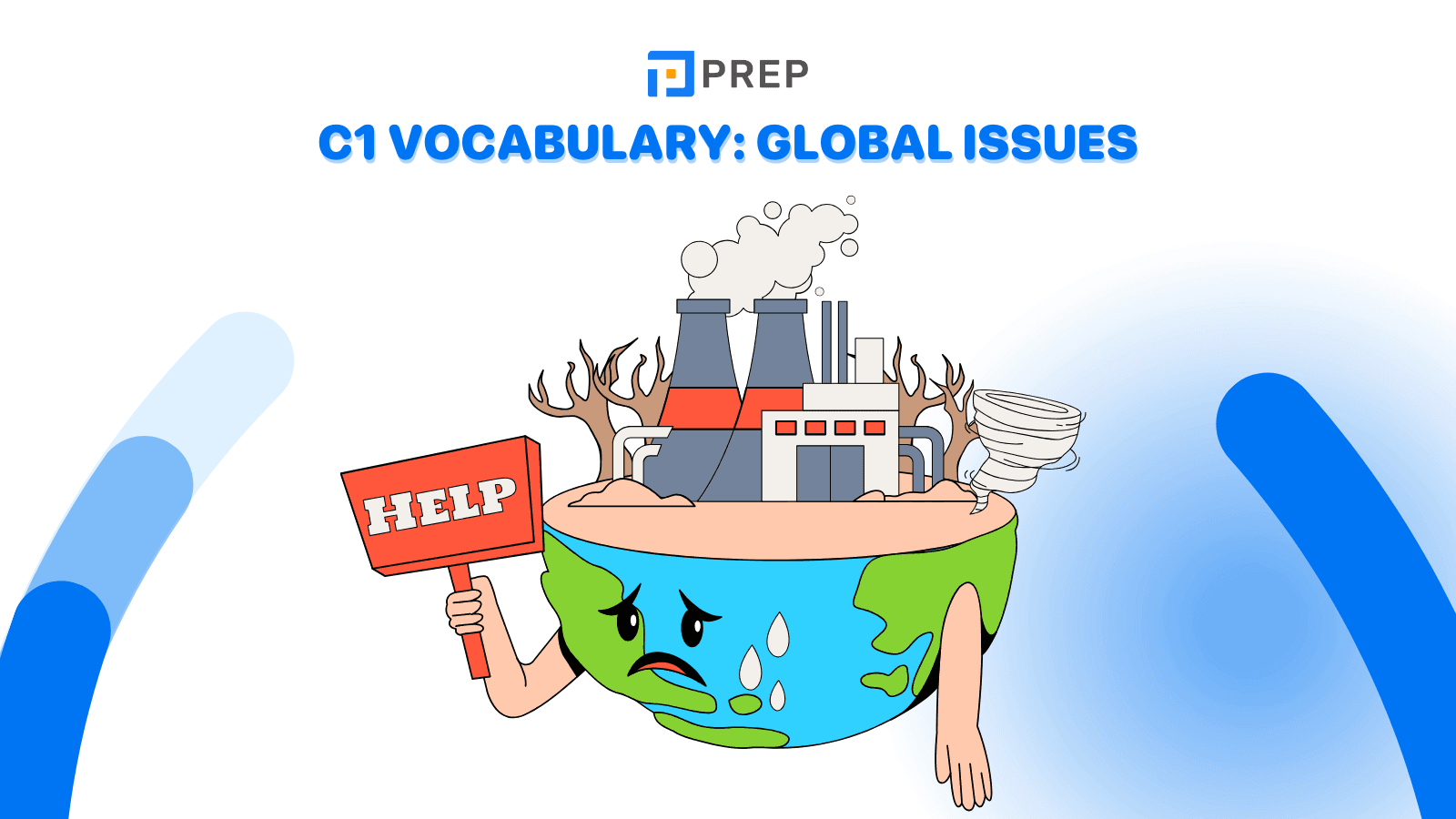
|
C1 vocabulary: Global issues |
|
| a challenge (n): a new or difficult task that tests somebody’s ability and skill | brain drain (n): the movement of highly skilled and qualified people to a country where they can work in better conditions and earn more money |
| global warming (n): the increase in temperature of the earth’s atmosphere that is caused by the increase of particular gases, especially carbon dioxide | child labour (n): the employment of children in an industry or business, especially when it is illegal |
| natural disaster (n): a sudden and violent event in nature (such as an earthquake, hurricane or flood) that kills or injures a lot of people or causes a lot of damage | civil war (n): a war between groups of people in the same country |
| overpopulation (n): the fact of a country or city having too many people living in it | deforestation (n): the act of cutting down or burning the trees in an area |
| pollution (n): the process of making air, water, soil, etc. dirty; the state of being dirty | famine (n): a lack of food during a long period of time in a region |
| terrorism (n): the use of violent action in order to achieve political aims or to force a government to act | genocide (n): the murder of a large number of people from a particular nation or ethnic group, with the aim of destroying that nation or group |
| urbanization (n): the process in which towns, streets, factories, etc. are built where there was once countryside | homelessness (n): the state of having no home |
| refugee (n): a person who has been forced to leave their country or home, because there is a war or for political, religious or social reasons | human trafficking (n): the crime of transporting or controlling people and forcing them to work in the sex trade or other forms of forced labour |
| antisocial behavior (n): actions which are considered to violate the rights of or otherwise harm others by committing crime or nuisance | illiteracy (n): a lack of the ability to read and write |
| domestic violence (n): the situation in which someone you live with attacks you and tries to hurt you | inequality (n): the unfair situation in society when some people have more opportunities, money, etc. than other people |
| economic crisis (n): a situation in which the economy of a country experiences a sudden downturn in its aggregate output or real gross domestic product (GDP) | joblessness/unemployment (n): the state of being without a job; the number of people without a job |
| gender imbalance (n): an uneven ratio between males and females in a particular situation or context | poverty (n): the state of being poor |
| human exploitation (n): the unjust or cruel abuse of one human being by another for their own ends | prostitution (n): the work of a prostitute |
| illegal immigration (n): the migration of people into a country in violation of that country's immigration laws, or the continuous residence in a country without the legal right to | racism (n): the unfair treatment of people who belong to a different race; violent behaviour towards them |
| social inequality (n): the existence of unequal opportunities and rewards for different social positions or statuses within a group or society | |
9. Hobbies & Entertainment
Let's join PREP in taking a look at advanced C1 vocabulary on the topic of hobbies and entertainment right in the table below!

|
C1 vocabulary: Hobbies & Entertainment |
|
| to take up a hobby (phrase): start a new hobby | an amateur (n): doing something for pleasure or interest, not as a job |
| to have a go at something/to try my hand at something (phrase): to make an attempt to do something | an aficionado (n): a person who likes a particular sport, activity or subject very much and knows a lot about it |
| to be into something (phrase): Like something | binge watching (n): the practice of watching several episodes of a TV show on one occasion, usually by means of DVDs or digital streaming |
| a passion for something (phrase): have a very strong feeling of love, hate, anger, enthusiasm, etc. for something | arts and crafts (n): activities that need both artistic and practical skills, such as making cloth, jewellery and pottery |
| a big/huge/massive fan of (phrase): | archery (n): the art or sport of shooting arrows with a bow |
| to unwind (v): to stop worrying or thinking about problems and start to relax | ballroom dancing (n): a type of dancing done with a partner and using particular fixed steps and movements to particular types of music such as the waltz |
| to let your hair down (phrase): to relax and enjoy yourself, especially in a lively way | bodybuilding (n): the activity of doing regular exercises in order to make your muscles bigger and stronger |
| to get into shape (phrase): to take exercise, eat healthy food, etc. in order to become physically fit | cosplay (n): the activity of dressing up as a character from a film, book or video game |
| to be beneficial for mental and physical health (phrase): | fencing (n): the sport of fighting with long thin swords |
| to strengthen immune system (phrase): | hang out with friends (phrase): go out with friends |
10. Human body
Let’s have a closer look at the advanced C1 vocabulary on human body in the below table!
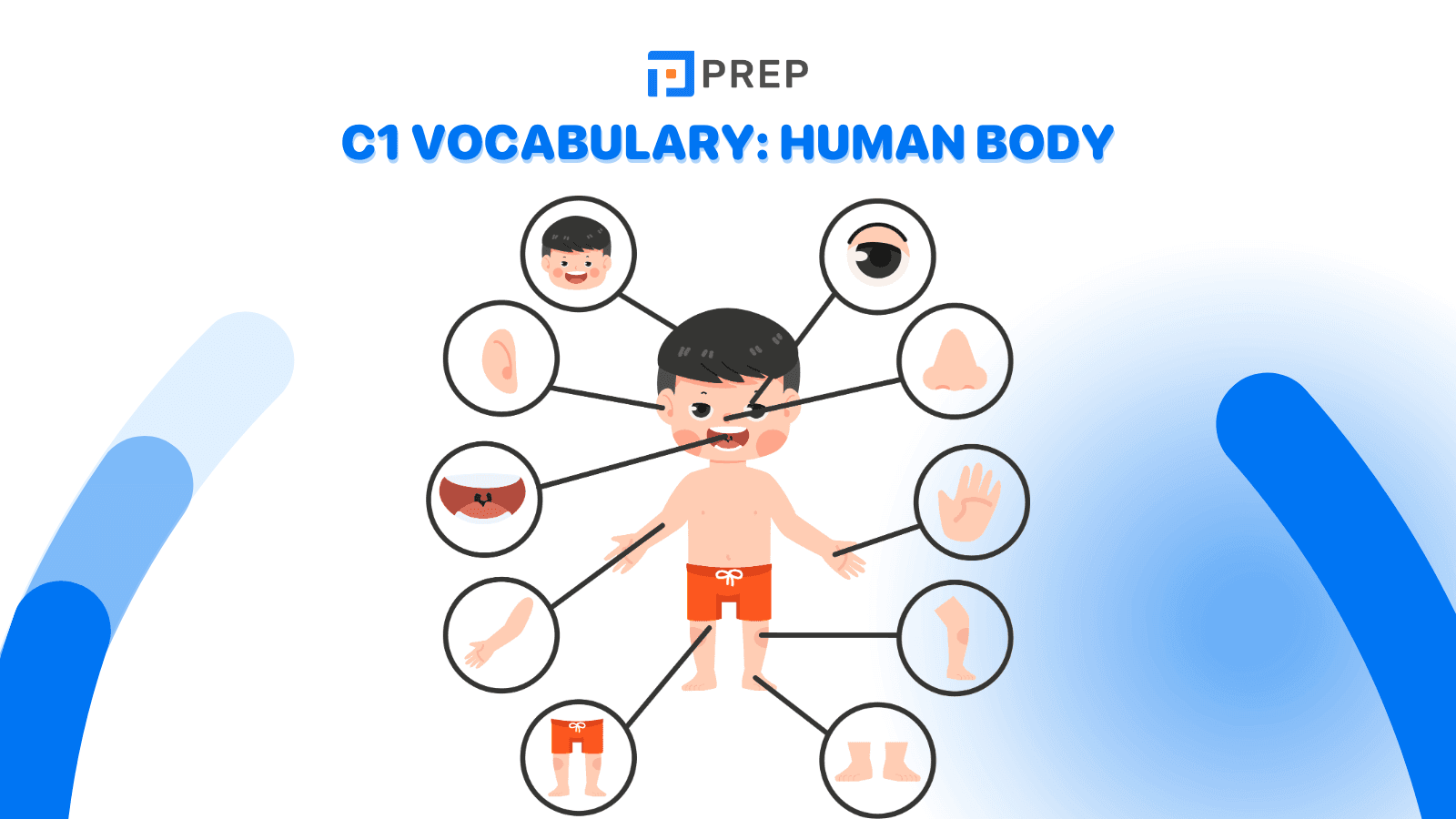
|
C1 vocabulary: Human body |
|
| circulatory system (n): the system concerned with the transport of blood and lymph, consisting of the heart, blood vessels, lymph vessels, etc | aorta (n): the main artery through which blood leaves your heart before it flows through the rest of your body. |
| digestive system (n): the system in your body that digests the food you eat. | artery (n): the tubes in your body that carry blood from your heart to the rest of your body. |
| bronchial tree (n): the bronchi and all of their subsequent branches | capillary (n): a very thin tube, especially one of the smaller tubes that carry blood around the body |
| endocrine gland (n): any of the organs of the body, such as the pituitary gland or the ovaries, that produce and release hormones into the blood to be carried around the body | cardiac (adj): of the heart or heart disease |
| excretion (n): to get rid of material such as solid waste or urine from the body | cerebellum (n): a large part at the back of the brain that controls your muscles, movement, and balance |
| homeostasis (n): the ability or tendency of a living organism, cell, or group to keep the conditions inside it the same despite any changes in the conditions around it, or this state of internal balance | cerebrum (n): the front part of the brain, that is involved with thought, decision, emotion, and character |
| hormone (n): any of various chemicals made by living cells that influence the development, growth, sex, etc. of an animal and are carried around the body in the blood | cranium (n): the hard bone case that gives an animal's or a human's head its shape and protects the brain |
| immune system (n): the cells and tissues in the body that make it able to protect itself against infection | epidermis (n): the thin outer layer of the skin |
| metabolism (n): all the chemical processes in your body, especially those that cause food to be used for energy and growth | esophagus (n): the tube in the body that takes food from the mouth to the stomach |
| pathogen (n): any small organism, such as a virus or a bacterium that can cause disease | hemoglobin (n): a substance in red blood cells that combines with and carries oxygen around the body, and gives blood its red colour |
| reproductive organs (n): a collection of organs and a network of hormone production that work together to create life. | ligament (n): a strong band of tissue in the body that connects bones and supports organs and keeps them in position |
| respiration (n): the act of breathing | neurone/neuron (n): a cell that carries information within the brain and between the brain and other parts of the body |
| skeleton (n): the structure of bones that supports the body of a person or an animal; a model of this structure | plasma (n): the clear liquid part of blood, in which the blood cells, etc. float |
| femur (n): the large, thick bone in the top part of the leg between the hip and the knee | platelet (n): a very small part of a cell in the blood, like a disc in shape. Platelets help to clot the blood from a cut or wound. |
| sternum (n): the long flat bone in the chest that the seven top pairs of ribs are connected to | synapse (n): a connection between two nerve cells |
| ventricle (n): either of the two lower spaces in the heart that pump blood to the lungs or around the body | |
11. Human characteristics
Let’s discover advanced adjectives featuring human characteristics with PREP in the below table!

|
C1 vocabulary: Human characteristics |
|
| a people person (n): a person who enjoys, and is good at, being with and talking to other people | big-mouth (n): a person who talks a lot, especially about him- or herself, and who cannot keep secrets |
| chatterbox (n): a person who talks a lot, especially a child | bossyboots (n): a person who always tells people what they should do |
| cool as a cucumber (n): very calm and showing control, especially in a difficult situation | cheap-skate (n): a person who does not like to spend money |
| dark horse (n): a person who does not tell other people much about their life, and who surprises other people by having interesting qualities | cold fish (n): a person who seems unfriendly and without strong emotions |
| eager beaver (n): an enthusiastic person who works very hard | have a screw loose (phrase): to be slightly strange in your behaviour |
| happy camper (n): someone who is happy with their situation | moaning minnie (n): someone who annoys other people by complaining all the time |
| laid-back (adj): relaxed in manner and character; not usually worried about other people's behaviour or things that need to be done | scrooge (n): someone who spends as little money as possible and is not generous |
| life and soul of the party (n): someone who is energetic and funny and at the centre of activity during social occasions | wet blanket (n): a person who says or does something that stops other people enjoying themselves |
| smart cookie (n): a clever person who makes good decisions | wimp (n): a person who is not strong, brave, or confident |
| affable (adj): friendly and easy to talk to | aloof (adj): not friendly or willing to take part in things |
| amicable (adj): relating to behaviour between people that is pleasant and friendly, often despite a difficult situation | apathetic (adj): showing no interest or energy and unwilling to take action, especially over something important |
| benevolent (adj): kind and helpful | belligerent (adj): wishing to fight or argue |
| broad-minded (adj): willing to accept many different types of behaviour, beliefs, or choices in other people | boisterous (adj): noisy, energetic, and rough |
| chivalrous (adj): polite, honest, fair, and kind towards women | cantankerous (adj): arguing and complaining a lot |
| demure (adj): quiet and well behaved | capricious (adj): changing mood or behaviour suddenly and unexpectedly |
| diplomatic (adj): involving diplomats or the management of the relationships between countries | cynical (adj): believing that people are only interested in themselves and are not sincere |
| erudite (adj): having or containing a lot of knowledge that is known by very few people | dogmatic (adj): If you are dogmatic, you are certain that you are right and that everyone else is wrong |
| exuberant (adj): very energetic | eccentric (adj): strange or unusual, sometimes in a humorous way |
| genuine (adj): If something is genuine, it is real and exactly what it appears to be | extremist (n): a person whose opinions, especially about religion or politics, are extreme, and who may do things that are violent or illegal for what they believe |
| gregarious (adj): liking to be with other people | fastidious (adj): being careful that every detail of something is correct |
| imaginative (adj): having or showing new and exciting ideas | flamboyant (adj): different, confident and exciting in a way that attracts attention |
| level-headed (adj): calm and sensible; able to make good decisions even in difficult situations | hypocrite (n): a person whose behaviour does not meet the moral standards or match the opinions that they claim to have |
| level-headed (adj): calm and sensible; able to make good decisions even in difficult situations | idealist (n): a person who believes that a perfect life, situation, etc. can be achieved, even when this is not very likely |
| open-hearted (adj): kind and friendly | impetuous (adj): acting or done quickly and without thinking carefully about the results |
| open-minded (adj): willing to listen to, think about or accept different ideas | indolent (adj): not wanting to work |
| realist (n): a person who accepts and deals with a situation as it really is and does not try to pretend that it is different | insensitive (adj): not realizing or caring how other people feel, and therefore likely to hurt or offend them |
| risk taker (n): someone who often takes risks | irascible (adj): made angry easily |
| rebellious (adj): unwilling to obey rules or follow generally accepted standards of behaviour, dress, etc. | materialist (n): a person who believes that money, possessions and physical comforts are more important than spiritual values in life |
| taciturn (adj): tending not to say very much, in a way that seems unfriendly | meddlesome (adj): enjoying getting involved in situations that have nothing to do with them |
| volatile (adj): changing easily from one mood to another | obstinate (adj): refusing to change your opinions, way of behaving, etc. when other people try to persuade you to; showing this |
| obstinate (adj): refusing to change your opinions, way of behaving, etc. when other people try to persuade you to; showing this | materialist (n): a person who believes that money, possessions and physical comforts are more important than spiritual values in life |
| rebellious (adj): unwilling to obey rules or follow generally accepted standards of behaviour, dress, etc. | meddlesome (adj): enjoying getting involved in situations that have nothing to do with them |
| taciturn (adj): tending not to say very much, in a way that seems unfriendly | naive (adj): not showing enough knowledge, good judgement or experience of life; too willing to believe that people always tell you the truth |
| volatile (adj): changing easily from one mood to another | |
12. Science & research
There are many C1 vocabularies related to topics of science and research such as cells, chemistry, physics, etc. Let's explore these words together with PREP!

|
C1 vocabulary: Science & Research |
|
| assumption (n): a belief or feeling that something is true or that something will happen, although there is no proof | cellulose (n): a natural substance that forms the cell walls of all plants and trees and is used in making plastics, paper, etc. |
| controlled experiment (n): a scientific experiment in which only one condition is changed in each of several tests in order to find out what effect that condition has on the results of the experiment | chromosome (n): one of the very small structures like thin strings in the nuclei (= central parts) of animal and plant cells. Chromosomes carry the genes. |
| empirical (adj): based on experiments or experience rather than ideas or theories | diffusion (n): the act of spreading something widely in all directions; the fact of being spread in all directions |
| evidence (n): the facts, signs or objects that make you believe that something is true | osmosis (n): the slow steady passing of a liquid through a membrane (= a thin layer of material) as a result of there being different amounts of dissolved substances on either side of the membrane |
| hypothesis (n): an idea or explanation of something that is based on a few known facts but that has not yet been proved to be true or correct | photosynthesis (n): the process by which green plants turn carbon dioxide and water into food using energy obtained from light from the sun |
| inference (n): something that you can find out indirectly from what you already know | autotrophic (adj): able to make its own food using simple chemical substances such as carbon dioxide |
| precision (n); the quality of being exact, accurate and careful | chlorophyll (n): the green substance in plants that takes in light from the sun to help them grow |
| qualitative data (n): data representing information and concepts that are not represented by numbers | germinate (v): when the seed of a plant germinates or is germinated, it starts to grow |
| quantitative data (n): measures of values or counts and are expressed as numbers | pollinate (v): to put pollen into a flower or plant so that it produces seeds |
| clinical trial (n): a research study in which a medical treatment is carefully tested on people in order to assess how safe and effective it is | transpiration (n): the process of water passing out from the surface of a plant or leaf |
| risk assessment (n): the act of identifying possible risks, calculating how likely they are to happen and estimating what effects they might have, especially in the context of a company taking responsibility for the safety of its employees or members of the public | catalyst (n): a substance that makes a chemical reaction happen faster without being changed itself |
| accuracy (n): the state of being exact or correct; the ability to do something with skill and without making mistakes | compound (n): a thing consisting of two or more separate things combined together |
| intellectual property (n): an idea, a design, etc. that somebody has created and that the law prevents other people from copying | molecule (n): a group of atoms that forms the smallest unit that a substance can be divided into without a change in its chemical nature |
| radiation (n): powerful and very dangerous rays that are sent out from radioactive substances | precipitate (v): to make something, especially something bad, happen suddenly or sooner than it should |
| ultraviolet (n): of or using electromagnetic waves that are just shorter than those of violet light in the spectrum and that cannot be seen | amplitude (n): the greatest distance that a wave, especially a sound or radio wave, vibrates (= moves up and down) |
13. Universe
The final topic that PREP introduces in this article is Universe. Initially, this topic is confusing as it is not commonly encountered in daily life. However,don’t worry! The table below will provide some advanced vocabulary to help us explore and understand this topic!

|
C1 vocabulary: Universe |
|
| a constellation (n): a group of stars that forms a shape in the sky and has a name | NASA (National Aeronautics and Space Administration) (n) |
| a solar/lunar eclipse (n): an occasion when the moon passes between the earth and the sun so that you cannot see all or part of the sun for a time; an occasion when the earth passes between the moon and the sun so that you cannot see all or part of the moon for a time | manned space flight (n): space travel in vehicles with a human crew |
| acceleration (n): an increase in how fast something happens | space voyages (n): a journey outside the Earth's atmosphere |
| aerospace (n): producing or operating aircraft or spacecraft | to launch out a on a long voyage (phrase): start a long journey |
| asteroid (n): one of many large rocks that circle the sun | weightless condition (n): the fact of having or appearing to have no weight, for example because there is no gravity |
| astronomy (n): the scientific study of the sun, moon, stars, planets, etc. | zero gravity (n): a state in which there is no gravity, or where gravity has no effect, for example in space |
| astrobiology (n): the scientific study of life on other planets | unidentified flying object (UFO) (n): a strange object that some people claim to have seen in the sky and believe is a spacecraft from another planet (the abbreviation for ‘unidentified flying object’) |
| black hole (n): an area in space that nothing, not even light, can escape from, because gravity (= the force that pulls objects in space towards each other) is so strong there | the Big Bang theory (n): the theory that the universe began with a very large explosion of a single mass of matter |
| galactic cluster (n): a comparatively young, irregularly shaped group of stars, often numbering up to several hundred, and held together by mutual gravitation; usually found along the central plane of the Milky Way and other galaxies | exoplanet (n): a planet outside the solar system |
| cosmological simulation (n): simulations of a significant portion of the universe over a significant portion of the universe's life, a branch of computational astrophysics | |
See more articles:
- A complete and accurate collection of A2 vocabulary
- A complete and accurate collection of B1 vocabulary by topic
- A complete collection of English A1 vocabulary organized by topic
II. Download PDF book to learn C1 vocabulary effectively
To provide students with high-quality learning materials for C1 level vocabulary, PREP has compiled and summarized a selection of reliable and top-notch textbook recommendations. Download these resources and diligently practice for better proficiency!
III. Exercises on C1 vocabulary with detailed answers
1. Exercise: Fill in the blanks with the appropriate words
- My friend is studying ________ and spends countless nights observing celestial bodies through a powerful telescope.
- astronomy
- literature
- math
- Despite the sunny weather forecast, John remained a ________ and insisted that it would rain during the picnic.
- optimistic
- pessimist
- lazy
- The ________ is responsible for transporting oxygen and nutrients throughout the body, ensuring the proper functioning of organs and tissues.
- respiratory system
- circulatory system
- bronchial tree
- The industrial factory released toxic gasses into the air, contributing to the _______ of the surrounding environment and causing respiratory problems for the nearby residents.
- earthquake
- blackhole
- pollution
- As the sun set over the peaceful countryside, a small village nestled on the _______ of the city provided a serene escape from the hustle and bustle of urban life.
- skyscrapers
- commuter
- outskirts
2. Answer keys
- Astronomy
- Pessimist
- Circulatory system
- Pollution
- Outskirts
IV. Take the First Step Towards IELTS Success
Hopefully, the compiled C1 vocabulary provided by PREP above will help students quickly enrich their knowledge and facilitate easy usage in daily communication as well as English proficiency tests. If your goal is to achieve a Band 7 or higher, these IELTS resources are for you :
- Best IELTS coaching: Score Big in IELTS With Our Expert Tips!

Hi I'm Chloe, and I am currently serving as an Product Content Administrator at Prep Education. With over five years of experience in independent online IELTS study and exam preparation, I am confident in my ability to support learners in achieving their highest possible scores.
Comment
Premium content
View allPersonalized roadmap
Most read








